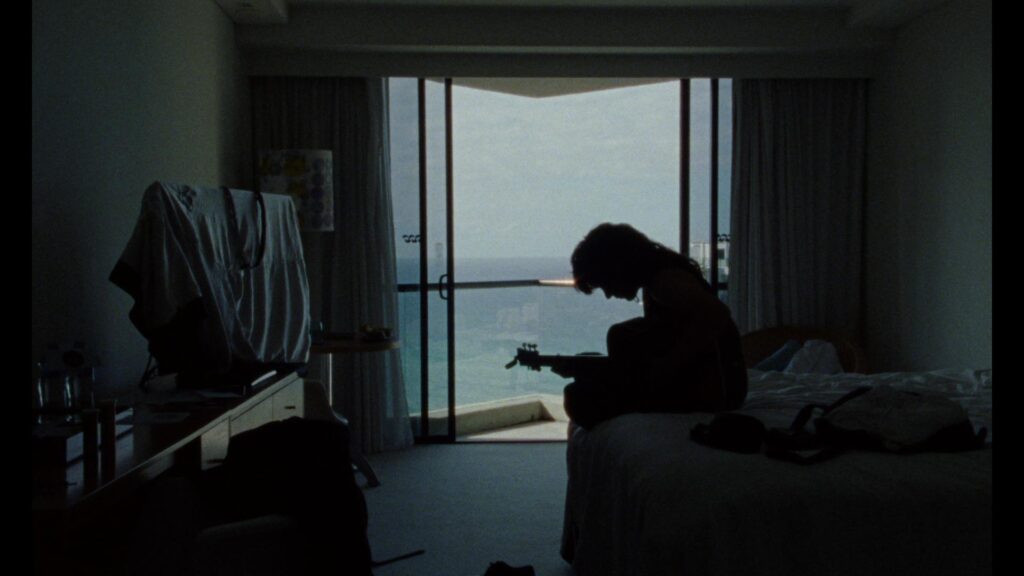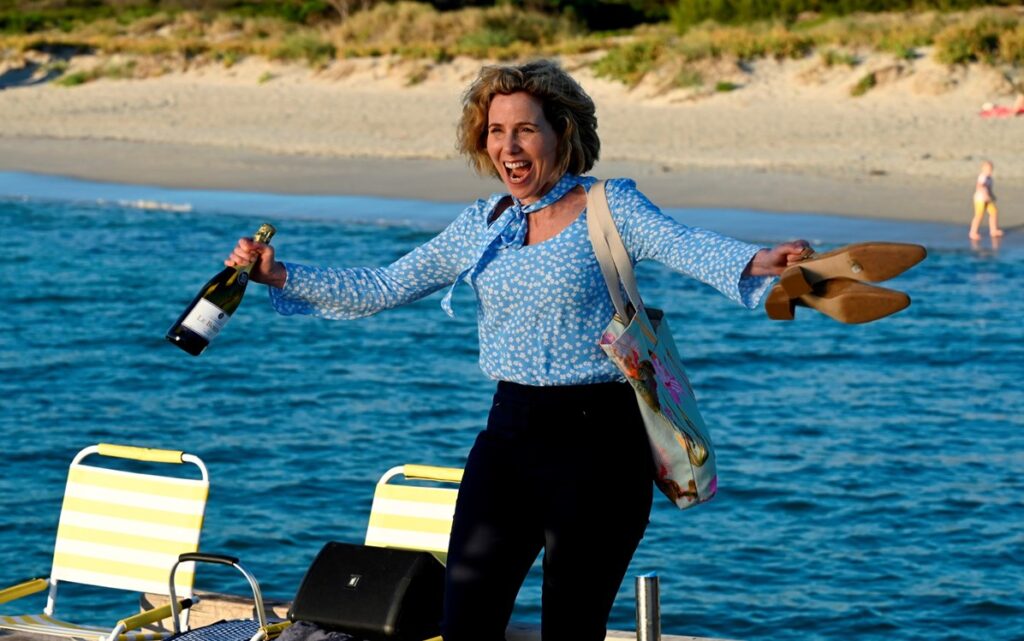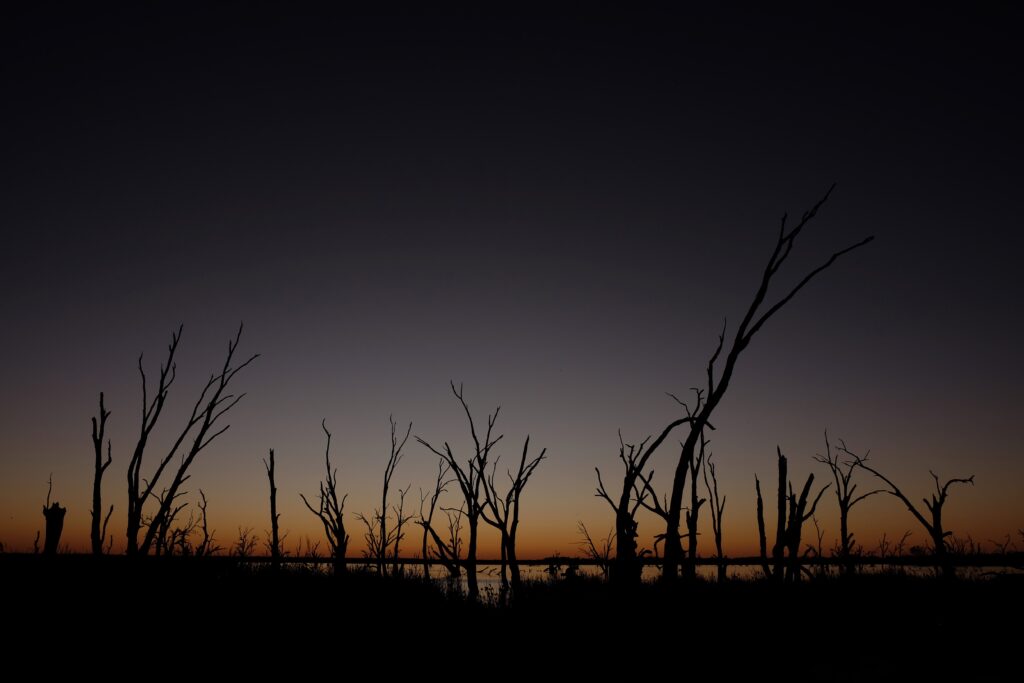We’re in the back half of 2022, which means it’s a great time to take a look at some of the very best Australian films released during the year so far. From the contemplative and reflective Ablaze to the bloody and biting Wyrmwood: Apocalypse, the selection of excellent Aussie films from a diverse array of filmmakers show that Australian cinema keeps pushing into exciting new areas
Honourable mentions include: Ithaka, The Dreamlife of Georgie Stone, Sissy, Shane, The Drover’s Wife: The Legend of Molly Johnson, Television Event
Presented in alphabetical order, the below films have received theatrical, festival, and online releases across Australia.
Ablaze
Directors: Alec Morgan and Tiriki Onus
I first watched this truly essential documentary about First Nations filmmaker Bill Onus back when it screened for the Melbourne Documentary Film Festival in 2021, and it is yet to leave my mind. The journey that co-directors Alec Morgan and Tiriki Onus (Bill’s grandson) take viewers on is an immersive and contemplative one, considering the history that has been lost within the films of Bill Onus. These are works that span from documentary to activist works from the 1950s onwards, encompassing pivotal figures in Aboriginal history like WW2 soldier Reg Saunders.
Currently screening on ABC iView, Ablaze is a documentary that reminds us of the value of saving and restoring the collection that sits within the NFSA. Additionally, the deep cultural value and importance of maintaining and securing the history of the First Nations people of this land we call Australia rings through loud and clear. Everyone needs to watch Ablaze.
Read my interview with Tiriki Onus here, and then if you’re still not swayed, check out my review here.
Anonymous Club
Director: Danny Cohen
When I first heard that there would be a documentary on Courtney Barnett, I was a little apprehensive of what might eventuate from it. As one of the more unique figures in Australian music, I was concerned that a documentary might not reflect her personality on film comfortably enough to present who she is as a person.
After watching Danny Cohen’s absolute masterpiece of a documentary, Anonymous Club, I questioned myself why I was concerned in the first place. This is a rarity in the manner that Danny gives Courtney the space to be herself, to reflect on who she is as a person, and to consider the weight of her lyrics and the impact they may have on her followers. Eschewing the norms of the format, Anonymous Club immerses viewers completely into Courtney’s world, with the singers inner thoughts captured on a Dictaphone like the flashes of introspection that they are, and given to Danny to marry up with footage of her on tour. This may not convert viewers to become fans of Barnett, but it will certainly give them the space to appreciate who this celebrated artist is.
Read my interview with Danny Cohen here, and then follow it up with my review of Anonymous Club here.
Elvis
Director: Baz Luhrmann
No one captures excess, glitz, and glory like Baz Luhrmann does, so after the perfect pairing of Baz and The Great Gatsby, it makes complete sense that he would turn his attention to the life of the one and only Elvis Presley. With partner and creative collaborator Catherine Martin by his side, Baz brought 60s America to the Gold Coast and conjured a heady, giddy experience like no other. Luhrmann’s Elvis rejects the notion of what a biopic should conform to, instead becoming partly a jukebox musical, part tragedy, part Nightmare Alley-homage, and 100% high energy entertainment.
By way of spiritual possession, Austin Butler quite simply becomes Elvis in a way that the swathes of impersonators on the Vegas Strip can only dream about. His hips gyrate in an alluring fashion that will have folks who are that way inclined slink in the seats in awe, and for those who want to be Elvis, it’ll have them testing out their best moves in the shower so they can hope for some of that Elvis electricity in their life.
In a field of superheroes and digital dino creations, it’s Baz Luhrmann who has created the bonafide, true blue, must see cinematic event of the year in Elvis.
Not convinced? Then give Hagan’s praise-filled review a read here, and check out Catherine Martin and Olivia DeJonge talking about the film here and here.
General Hercules
Director: Brodie Poole
From the golden glory of Elvis, to the political aspirations of gold prospector, musician, and philosopher John Katahanas aka General Hercules. Brodie Poole’s feature documentary debut masterfully echoes Rats in the Ranks, supplanting the machinations of a mayoral race from the suburbs to the remote town of Kalgoorlie-Boulder. At times, General Hercules bounces from being a pitch-black comedy with Kalgoorlie’s splendid array of larrikins providing pitch perfect Aussie laughs, to becoming a bleakly observant glimpse into the future where the mammoth Super Pit will eventually consume the town and all within it.
The vibrancy and life that thrives within General Hercules is powerfully realised with meticulous and referential editing by Annika Damon, Nina Pavlovic and Brodie Poole, which is elevated by Josh Wilkinson’s transformative and unsettling score. Every element of General Hercules is meticulously crafted, heralding the arrival of a seriously great new documentarian talent in Australian cinema.
While General Hercules has only had a festival appearance at the Sydney Film Festival, it will definitely appear down the line, so keep an eye out for it.
If you want to read me heaping praise on Brodie Poole even more, then check out my interview with him here, and read my review here.
Here Out West
Directors: Lucy Gaffy, Ana Kokkinos, Leah Purcell, Fadia Abboud, Julie Kalceff
It’s been a while since Australia had a great anthology film, and it’s a treat to be able to say that the collaborative film Here Out West has set the standard for what anthology films in Australia can do. Featuring a culturally diverse creative team, including cast, directors, and writers, Here Out West gives viewers a day-in-the-life perspective of its multicultural group of characters.
Rejecting familiar sights and landmarks, Here Out West embraces the stories of those who keep society moving, from the nursing staff at hospitals working the late shifts, to the family-run restaurants that feed the suburbs, to parking attendants. While this makes Here Out West sound dry on paper, the reality is quite different, with it being a wonderfully joyous film at points, emotionally devastating at others, and is always a soul enriching and life affirming. There has been a welcome push around the world to ensure that the film and television entertainment we engage with reflects our day to day lives, and Here Out West embraces that notion wholeheartedly. Here’s hoping this is the first of many anthology films like this.
(Leah Purcell’s work on Here Out West and her directorial feature debut The Drover’s Wife: The Legend of Molly Johnson heralds the arrival of an exciting directorial voice in Australian film. I can’t wait to see where she goes from here.)
For a wonderful deep-dive review of Here Out West, please read Nisha-Anne’s piece here.
How to Please a Woman
Director: Renée Webster
An occasional question I get as a film critic is about comedy films that made you laugh so hard that you cried. I would often struggle for an answer, usually only coming up with Airplane/Flying High as a prime example. Well, thanks to Renée Webster, I’ve got a new answer with the uproarious comedy How to Please a Woman.
As a perfect crowd-pleasing delight, How to Please a Woman aims to entertain, excite, and entice viewers into reconsidering the titular statement: how to please a woman. Is it by cleaning a house and taking care of domestic duties, or is it something a little more carnal? Alongside lead actress Sally Phillips, Renée Webster answers those questions brilliantly with one of the funniest scripts Australian audiences have joyfully embraced.
I know that this is a film that I’ll turn to time and time again for that positive uplift in my life, and I’m certain that it’ll continue to be that kind of film for others around the world. I genuinely love this film completely, with my review, and interviews with Renée Webster, and producers Tania Chambers and Judi Levine helping reaffirm that statement.
Shadow
Director: Bruce Gladwin
Back to Back Theatre’s first film Shadow is an adaptation of their acclaimed stage play The Shadow Whose Prey the Hunter Becomes, and given the quality of it, here’s hoping it’s not the only film we see from the theatre company. Shadow is a new benchmark for Australian cinema, acting as a shake up and reclamation of the creative space for the intellectually disabled. Shadow interrogates and critiques the cruelty of humanity, shining a light on how its greatest creation – artificial intelligence – will eventually overwhelm us all. In a humbling moment, a prescient line of dialogue highlights the impact of this growing threat: “We’ll all be intellectually disabled in comparison to artificial intelligence.”
Simon Laherty, Sarah Mainwaring and Scott Price lead as a trio of activists at a town hall meeting, each delivering performances that you’ll never forget. All of them deserves any accolades that come their way, but it’s within Sarah’s acting that I’ve seen the very best performance of the year so far. As a collaborative effort, Shadow gives breathing space to its cast, who all execute the masterfully written script perfectly. Shadow is peppered with darkly comedic moments that are paired alongside sublime moments of almost surrealist drama. A late blooming heated discussion between the three leads has its spine-tingling energy elevated in powerful fashion with the presence of a band tuning up behind them, adding to the almost absurd vibe of the film.
I want more from this company right away. I can’t wait to revisit this film.
Shadow has been traveling across the festivals in Australia, with a successful launch at the Sydney Film Festival and a run in Perth for the Revelation Film Festival before heading to Darwin. Keep an eye on the Back to Back Theatre’s website for details. For more on the film, read my interview with Scott Price and producer Alice Fleming here.
Wash My Soul in the River’s Flow
Director: Philippa Bateman
The old saying that ‘each film is a miracle’ feels most apt when it comes to Philippa Bateman’s transcendent concert film Wash My Soul in the River’s Flow. As a reinvention of the format, Wash My Soul in the River’s Flow presents the awe-inspiring concert that saw First Nations singer-songwriters Archie Roach and Ruby Hunter collaborate with Paul Grabowsky and the 22-piece Australian Art Orchestra.
Rehearsal footage from the sound studio where Archie and Ruby joke and reminisce about their past flows seamlessly into the immersive concert footage where the same stories are shared with the audience, helping inform the songs that Archie and Ruby sing with passion and power. Interspersed between songs is the emotional cinematography by Bonnie Elliott (one of the great cinematographers working in Australia today), who uses drone work and abstract imagery to reflect and showcase the connection to country that Archie and Ruby sing about.
Wash My Soul in the River’s Flow is as essential and valuable as Sydney Pollack’s Amazing Grace or Ahmir “Questlove” Thompson’s Summer of Soul. It’s magnificent and masterful, sweeping you in its wake and carrying you along for the waterway for its journey. Yes, every film is a miracle, but this one in particular is one of the most precious miracles of them all.
Warrawong… the windy place on the hill
Director: Simon Target
Aussie short films have been truly impressive this year, with Maya Newell’s The Dreamlife of Georgie Stone and Chris Elena’s Refused Classification both leaving marks on my mind. But it’s Simon Target’s considered documentary short Warrawong… the windy place on the hill that has summoned a stillness in my mind akin to the feeling that I get from watching a Kelly Reichardt film.
Following Sue and Brian, a couple in their 70s living in the remote NSW town of Tooraweenah, Target presents a world of growing isolation and loss in a frank and considerate manner. Embracing the tenets of slow cinema, Warrawong… the windy place on the hill is constructed of motifs where Target just observes the world going by. Whether it be Brian tending to his dwindling livestock, or Sue trying to retrieve mail from her too-high mailbox, or even just the vast green of the pastural landscape, this 29-minute documentary encourages you to slow your breathing, take a moment, and just consider life for a moment.
In one moment, Brian talks about the aged trees that stand like defiant figures against time itself on his property. They have existed long before he arrived and should continue to exist long after he is gone. In the face of nature, our existence becomes almost meaningless, but we persist, and we commune together undertaking activities that while away our days. This may sound morbid, or even dour, but Warrawong… the windy place on the hill posits a feeling of comfort in your mind, acknowledging that our impermanent nature is reason enough to celebrate being human.
Warrawong… the windy place on the hill screened at the Sydney Film Festival and will no doubt have further festival appearances down the line. I talked to Simon Target while he was in Poland presenting the film, and I encourage you to read that interview here.
Wyrmwood: Apocalypse
Director: Kiah Roache-Turner
From the quiet and subtle to the adrenaline fuelled zombie mayhem of Wyrmwood: Apocalypse. This full-throttle high-octane sequel to the cult favourite Wyrmwood: Road of the Dead brings back everything that made the first film a success and turns it up to twelve. Creativity runs supreme with a wealth of indie filmmaking intuition making practical effects look like ten million bucks, and no doubt leading to a legion of inspired cosplayers and horror fans imitating the blood-soaked aesthetic.
The interesting take on zombies is given a b-grade boost in this sequel, with Kiah Roache-Turner and co-writer Tristan Roache-Turner both delighting in utilising shlocky horror movie tropes and turning them on their head. For me, the most memorable and exciting moment in Wyrmwood: Apocalypse comes with the arrival of the exhilarating high-speed drone work that accelerates the energy of the film to breaking point, getting the jump on Michael Bay’s Ambulance for setting the template on how fast paced drone work should be done.
If gore and indie filmmaking is your bag, then make sure to check out the two-part interview with director Kiah Roache-Turner from the 2021 Sydney Film Festival where Wyrmwood: Apocalypse launched here and here.












